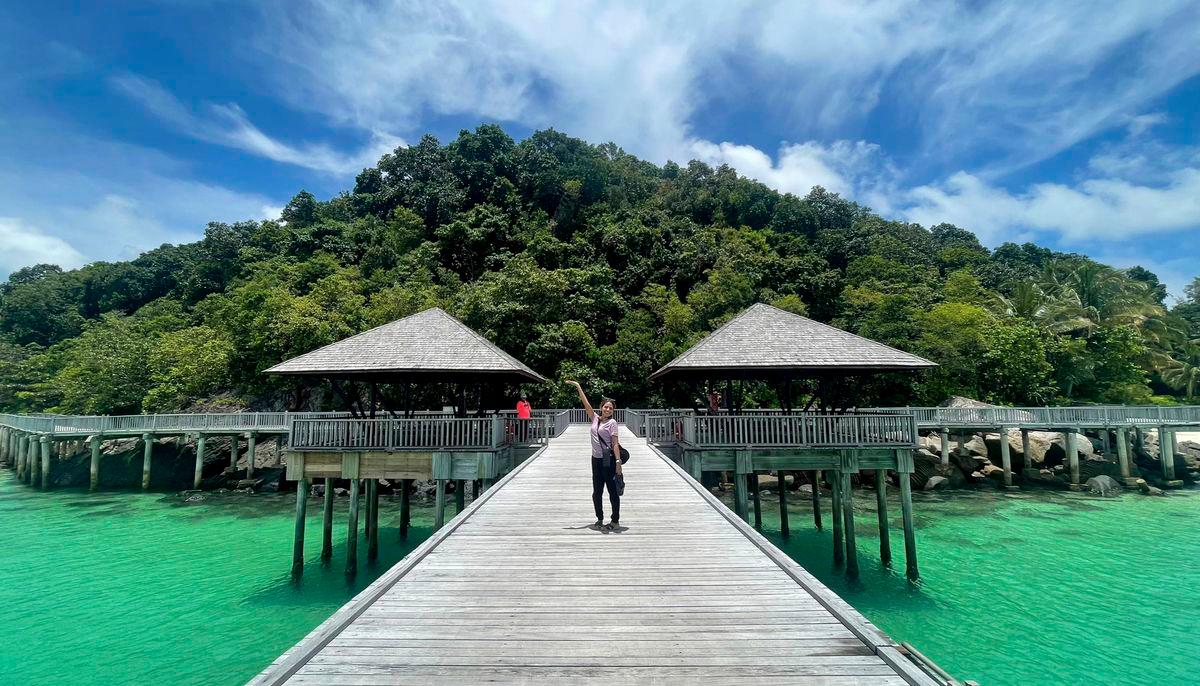MERSING: Batu Batu Resort founder Cher Chua-Lassalvy never set out to build a conservation movement when she first set foot on Pulau Tengah island more than a decade ago, as her goal was modest, namely to do no harm.
“At the start, it was simple. Let us just not spoil what is here.”
That quiet commitment shaped every decision, such as no boat anchors dropped on coral heads and no bright lights disturbing nesting turtles, and one act of care led to another.
“We hired a marine biologist to educate guests.
“Soon she told us, ‘I do not just want to give talks. I want to save the sea.’ So, we hired another. Then two became three, and three became four,” she said.
What began as an eco-minded resort slowly evolved into a hub for research and restoration.
Today, Tengah Island Conservation (TIC), which spun off as an independent NGO in 2019, holds over a decade’s worth of biodiversity data from seven surrounding islands.
“Those records did not exist before. Now, policymakers can plan coastal development with real science,” she said.
Cher and her husband still run Batu Batu, which continues to provide staff housing and flexible funding for TIC.
“That kind of support is rare and vital. Grants could buy a boat or fund a project manager, but not the everyday costs that keep an organisation alive,” she said.
People at the heart of conservation
Over time, Cher realised that protecting nature meant working with those who live closest to it.
“We could not make a lasting difference without involving the communities around us.”
Early efforts focused on schools, which she admitted is “the easier audience”, but the urgency of climate change soon demanded broader engagement.
“These islanders understand climate change in ways we do not. They notice shifts in the sea and weather long before outsiders do.”
Today, TIC supports alternative livelihoods. Locals rent boats to researchers, cater meals, host festivals and open their homes as dance spaces for children.
“It builds an economy within conservation. It gives kids a reason to dream of higher education without leaving their heritage behind.”
To her, conservation is not charity but common sense.
“When you save nature, you cannot show a profit line. But look at coastal erosion. Governments spend millions on seawalls while healthy coral reefs do that job for free.”
She expressed hope that Malaysia would become a regional leader in regenerative tourism.
“Compared with Thailand or Indonesia, we are relatively undeveloped. It is not too late to plan wisely, protect small towns, celebrate authentic culture and avoid the mistakes of mass tourism.”
However, the sea remains unpredictable.
“Rising tides could erase everything,” she warned.
“Many locals might not say ‘carbon emissions’ but they feel stronger storms and shifting currents. Awareness is growing, but turning that into daily action takes time.”
But Cher remains hopeful.
“If everyone picks up plastic, if every boat slows down for dugongs, billions of small acts could add up.”
After a decade of work, Tengah’s reefs are showing signs of renewal.
“We are seeing more juvenile turtles now,” she said.
“Maybe it is the start of something bigger, a model in which nature, community and enterprise truly thrive together.”
Weaving heritage back to life
Across the water on Pulau Besar, 64-year-old Saudah Rastam, fondly known as Mak Oda, keeps another legacy alive.
A master ketupat weaver since the age of 10, she is skilled in intricate styles such as kepala kambing (goat’s head) and manggis (mangosteen) patterns. But few young people are learning the craft.
“In those days, we did not have gadgets or games. We filled our time weaving ketupat.”
Mak Oda recalled the friendly weaving contests once held among island women, gatherings that celebrated creativity and community.
“Back then, we would compete in weaving contests. It was fun and brought us together. Now, the younger generation is too busy,” she said.
Pulau Besar village head Kelana Ali Kahar, respectfully known as Tok Kelana, 50, is determined to change that through cultural and sustainability programmes.
“This is about continuity, keeping our traditions alive.
“We plan to revive gazal and joget lambak performances, which are traditional music and dance, among our people.”
He recalled the lively nights of his youth when villagers performed bangsawan plays under the stars.
“When I was young, there were no televisions here.
“We entertained ourselves with stories of heroes, such as Hang Jebat, ghost tales, even ‘Romeo and Juliet’! Everyone gathered on the field. It was our theatre.”
He added that a recent month-long festival rekindled that old spirit.
“It brought our heritage to life through performances, sustainability efforts and knowledge-sharing.
“It highlighted not just our art and zapin dance, but also our commitment to eco-tourism, biodiversity and cultural heritage as the roots of sustainable development.”
Tok Kelana said Pulau Besar and its neighbouring islands hold immense potential.
“I am confident that our islands could grow into an international eco-tourism hub where culture and the environment thrive together.”









